Applications from the Science of Happiness
A study on The Science of Happiness
Happiness is hard to study being so subjective and difficult to define so science typically describes happiness as overall well-being or total life satisfaction. It tries to measure how well life is going for people, how much they enjoy life, how positive they are and if they are having regular positive verse negative outcomes. Some also point out that happiness is a modern construct and wasn’t believed to be for humans. It wasn’t something humans even considered as for most of history life was hard and short. Religion taught if your happy your sinning so they suppressed any notion of it until the Age of Reason and Enlightenment showed us we can be happy and it was a good indicator of how moral you were.
Another point to understand is happiness isn’t obvious, it is not something your consciously aware of until asked the question at which time you would have to think about it. To answer questions about happiness is a cognitive act, you must evaluate past events and really consider in an overall picture if you are generally happy, sad, angry, or content. Happiness, the act of being happy is simple an emotion that ebbs and flows like all emotions which is why most studies look at “total life satisfaction” or “overall well-being” as a measure of a person, society or nations.
What is clear is that being happy adds a lot to life and seems to be a better indicator of your health and longevity and even your success in work or relationships so you really want to consider making “happiness” one of your primary goals in life. Before making any decision consider reading this article and watching some of the professors and scientists who have studied happiness or wellbeing as a career and tell you what they learned. Then make your decision and consider the applications suggested near the end of the article.
Matthieu Ricard
[The Habits of Happiness – Matthieu Ricard]
A Buddhist monk shares his insights in a TED Talk and discusses the different meanings people can have about what happiness is like it being about passions, of living in the now or embarking on a journey toward compelling goals and then points many get a little confused about the difference between pleasure and happiness which may be subtle as many people misinterpret their feelings of pleasure with happiness and all through you will be happy when eating that nice thick fresh piece of chocolate cake the second one probably still tastes good and with a little psychological work to overcome your guilt and eat a third but if you keep eating your feeling of pleasure will turn to disgust. You come out of the cold into a house in front of a warm fire and it is beautiful, the warmth, the sounds and sight of the flame and after a while its burning you and you back away. Happiness is too vague so he prefers well-being which he explains as something deeper than fleeting emotions. Awareness and consciousness provides opportunity to change our perspective because emotions are fleeting and not a good guide. Two opposite mental factors or states cannot be there at the same time. You cannot shake hands and strike a blow at the same time, your cannot love and hate at the same time for the same object.
[Comment: A lot of talk about dopamine, the chemical associated with feeling good like when you experience love from a person, when you exercise, eat certain foods and of course some drugs or stimulants but chasing the dopamine high can lead to unhealthy habits like doing too much drugs, or spiking your coffee with a little brandy everyday, or falsely believing this adds to well-being or life satisfaction.]
Fred Luskin
[The Science of Happiness – Fred Luskin]
PhD in Psychology and teacher on forgiveness, well-being, and happiness. Luskin brings up many key points, one being how we deal with the “us” and “them” perspective. When you walk in a room do you look around at “them” as some kind of competition or something to avoid or your you see them as “us” where you can engage and share? Another question asked about quality of relationships is are they hard or easy. Think of someone who relationship with is very easy, it is not work, it just flows naturally and then think of those that that relationship is hard, it is always a mental challenge, or feelings that are just not right.
Achievements are in the past so what are you now? He comments about him being introduced as this and that, PhD but as he says that was 13 years ago so what about now? Is it our memory or the stories we tell our self? He says it is a major undertaking to be happy in a world where everything fades away. Then some story about a buddy letting him drive a really nice, expensive sports car and after driving it he thought to himself that it is nice but not that nice, that it didn’t do anything for him and he felt like he escaped one of the worldly values.
[Comment: This last point above is one that I feel personal development has done for me and that is to take 100% responsibility, nurture what I have and grow it. This leads to appreciation for what I have without envying other people’s things or the need to change it.]
Ed Diener
[The New Science of Happiness and Its Causes – Ed Diener]
Diener studied happiness for over 30 years with many large scale population and animal studies. (Diener & Chan, Diener & Seligman) In this lecture claims his evidence concluded that the link of happiness to health and longevity is clear and compelling. Happiness leads to health and longevity not the other way around he argues and happiness should be the starting place for people not a goal in the distance future, in other words get this right first and the likelihood of many other outcomes that measure life success will be much higher. Diener likes to discuss the “consequences” of being happy and this he feels backed by his 30 years of research claims that being happy determines more about your potential for success, health, longevity, good relationships, etc. and that it is happiness that causes many beneficial attributes to individuals and society as a whole.
Daniel Gilbert
[The Pursuit of Happiness – Daniel Gilbert]
Professor of Psychology at Harvard and Happiness Expert reveals data from his studies and the psychology behind what we think we want, what we get and how our biases that relationship. That it has only been in the last 100 years or so that people have become concerned about it as he quotes Hobbs “for most of human history life was nasty, short and brutish.”. Humans were not supposed to get what they wanted in this life, that is the reward of the afterlife.
He claims that theory was tested and happiness is getting what but how is it that people are getting exactly what they want but still not happy? How can this be he says, answer, wanting the wrong thing. The problem being “we don’t know what will make us happy.” Why is that? Psychologists have come up with two reasons:
- Imagination: Problems with mind and how we imagination what we think we want, what we would like and not like. Our imaginations, our ability to simulate in our mind what we think we would like or not like is not good. We are bad at guessing the future, our minds are stuck in the present. Example: Finish eating a big meal, we often say “I am stuffed I will never eat again” but of course several hours later we will be hungry. Example 2: People guessing how much we will change in the next 10 years, he claims in studies we all get it wrong.
- Social and Culture: Some of our cultures values are right and some of them are wrong. Brings up examples of advertising from the 60’s like smoke cigarettes, drink coke and watch lots of TV. Then brings up data on Marriage, Money and Children.
He shares results from studies on marriage, money and children. Married people rate happier on every scale but only if in a healthy marriage. Money does have an impact but only up to a certain amount (about $75k per/year) and then tapers off and children do not bring happiness in their studies.
Ruut Veenhoven
[Ruut Veenhoven – Evidence based pursuit of happiness]
Presentation to Italian Psychologists Veenhoven to talks about happiness being a recent phenomenon in human history beginning in the 17th century Enlightenment when it was discussed that happiness could be achieved by reason, against the churches philosophy who believed that happiness was not for people in this life but for us when we get to heaven, and life was for suffering. Enlightenment philosophy was happiness is not only good, but possible and the criteria to judge our lives creating moral consequentialism and moral utilitarianism. Enlightenment taught we can use our brain to get knowledge about happiness to be healthier and happier. Veenhoven claims progress on happiness declined in the 19th century mainly due to the church and their very different message, liberalists, socialists and many other urgent problems like poverty, epidemics, and wars.
Happiness regained interest in second half of the 20th century as the resistance of the church declined, wars ended and most are living in relatively peaceful conditions. Growth of knowledge and scientific publications. (400-500 publication a year now) Veenhoven uses an 8 quadrant box to help define happiness.
Veenhoven also claim some believed happiness was totally genetic which he claims is wrong but does account for some 30% in their findings, dumb luck being another 15% accounting for 45% of happiness so he claims more than half of the reasons for being happy or high life satisfaction are due to things we learn or do. I personally was happy to hear that Personal Development, a good education, having clarity on ones goals and having rational well thought through beliefs all shows a positive correlation. They found no correlation between happiness and IQ, in fact lower IQ’s tend to be happier. Social skills have shown improvement in happiness, and those that seek meaning in life but says it is possible that happier people seek meaning.
(Gray scales from lighter being less to darker being more – best of course to watch the presentation having the author explain it in context.)
As with Diener research and claims people, organizations and governments should be fully aware of the benefits of happy people. Happy workers are more productive and happy citizens are also more beneficial to society in their political views, tolerance, contributions to society, etc.
[Daniel: Another reason I argue “personal development” is the issue for the 21st Century. Many points made by these experts and researchers clearly show that rising above societal norms, pressures from marketers trying to convince to drink coke and have a happy life, and the psychological challenges one might encounter from their life experiences can all be resolved by personal development and with an awareness and goal to be happy then no matter what life throws at you at the very least you can be a personal of character, have developed yourself to be the best you can for your friends, family and this world. Strive to have purpose, meaning and direction in your life as it is these attributes that separate us from all other living species and makes us truly human]
Angus Deaton
[The Pursuit of Happiness – Angus Deaton]
Professor of Economics and International Affairs at Woodrow Wilson School is more famous for his work on inequality and economic and argues we are living in a unique time where many are healthier and happier but if not everyone climbs out together becomes a widening gap of inequality.
The Cantril Ladder 2008 Gallup World Poll survey asked 1000 people in every country every year this same question “Imagine a ladder with 10 steps and the top of the ladder is the best possible life for you and the bottom the worst possible life. On which step of the ladder you stand at this time?” This question has been asked about 3 million times producing the following data. Large circle on the top right is the USA, Denmark at the top and the two large circles on lower left are China and India with countries like Togo and Zimbabwe below them.
Logarithmic Scale with country names:
Deaton makes a good comment that different cultures have a very different way about the consideration about being happy as he growing up in Scotland say the Calvinistic view is that if you were happy the sediment would be you are sinning and going straight to hell where as in the USA they are all too eager to say how well life is going even if it isn’t.
More data from studies when ask various questions through a unique paging system to get people’s feelings at specific times during the week. In the graphs you can see slight increase of smiles and joy on the weekends, worry and stress during the workweek as you would expect .
Another graph showing money really does matter up to a certain amount. It is also different data from Gilbert’s data on money so makes a nice comparison study.
The graph below shows money really matters on life evaluation as compared to emotions and feelings.
This graph showing percentage of the population experiencing a lot of happiness by countries based on GDP is quite impressively that most world experience a lot of happiness, about 70% of the world, making this a happy planet.
Life tends gets better the older we get thinking we learn to manage our emotions better and don’t worry as much. Religious people tend to be happier on all accounts but then says places don’t do better, that in the US the more religious parts of the country also experience the highest rates of murder, and social pathologies and doesn’t know why this is.
[Daniel: Religious being happier makes sense psychologically for the following reasons; The fellowship of a bunch of people who profess to share similar values and beliefs, it is belonging to the same tribe mentality and apparent human need, the message that god, some all-powerful entity loves you, cares for you, and is looking out for you. Whether real or not real it can be good for you and something the Christian community does well. There is some real issues about trying to believe when deep down you feel it is a bunch of bullshit. This may setup a major internal conflict ending up causing social pathological states? Possibly why the religious US has the highest murders and crime rates? Why some seriously religious counties are poor, starving and seem to have no reasonable sense?]
Here too Deaton explain how such poll results can show such a dramatic effects by asking questions, in fact say it is clear that the results people give about how their life is going is dramatically affected by what questions were previously asked. How we are affected by Valentine’s Day and Christmas. How the stock market it doing and so on.
Summary:
What seems to be clear from watching these videos is that Happiness or Well-being does not come automatically, it is not something that just happens but something that requires awareness and constant effort to build and maintain in this ever increasingly challenging world. It also reveals that humans are not good at making choices that lead to happy conditions or states.
It also raises our awareness of our minds plasticity, and that we are really shaped by how we interpret events in the world, how the news, the stock market and many other social norms and meme’s can be helpful or harmful to your happiness or well-being. That external factors (environment) can and do impact one’s life and shape our biases if we are not careful of what we believe.
Happiness is a feeling, an emotion, a state of being that we can generate when we want. We can be clear about the difference between pleasure, our passion and purpose and meaning. That learning to appreciate who you are and what you have now is critical and that little things make a difference. Expectations can and often turn into entitlements and disappointments lowering our life satisfaction. Money up to a point can relieve burdens in turn mask happiness but the more you get the less you feel about others, the less you enjoy subtle things in life.
Generating happiness is a skill and an art that can be learned and formed like a great master piece which is a nice way to look at one’s life. This is not a practice run so make the best of it for you and all those you can touch with your happiness and well-being.
Happiness Applications:
- Emotions, feelings of pleasure are temporary and will turn to negative if too much so train your mind and raise your levels of awareness to have deeper responses and appreciations for people, the planet and all life forms. [Personal development is the Issue]
- Growing beyond worldly measures and values, keeping up with the Jones’s and the fleeting things the world subconsciously or directly tells us we should be, value, or do. [Personal development is the Issue]
- Attitude: Note how much you complain, get pissed or angry, argue and or judge others and especially note what your expressing these emotions to or who. These are a symptoms of some life dissatisfaction aren’t they? Luskin quote the Dahlia Lama “practice the conditions of happiness to be happy.” Find and apply the conditions that set the stage for happiness and satisfaction. (Forgiveness, understanding, compassion, openness, honesty, transparency, kindness, giving, generous, gratitude, appreciation.) Spend more time working on accepting yourself than being acceptable which you can never win at and the world try hard to get you to do. A simple exercise I did was to make a spreadsheet called Mood-State Monitoring, made a list of moods/states from very slight upset or complaint to pissed right off and recorded every time I swore, complained or got pissed and measured my states. Goal was to minimize my bitching and complaining to once every three months or less. [Personal development is the Issue]
- Appreciation: Want what you have, be satisfied with what you have instead of wishing that only if you would have got the other model, or the other color. Care for what you have, appreciate it and maintain it. Take care of your immediate environment, make the most of what you have without needing to get a bigger, faster, better one. [Personal development is the Issue]
- Health: It is really hard to appreciate, not want, be satisfied if your unhealthy. If you always tired, weak, ill with aches and pains, a body full of sugar, and processed foods easily leads to negative mental states and conditions. Make healthy foods and activities a priority and learn to form habits so you naturally do them and learn to like them. (Good habits are hard to make and easy to lose, bad habits are easy to make and hard to lose.)
- Make happiness a priority and decide to be happy. Don’t wait for things to come to be happy, don’t wait for people to change to be happy. Make this a goal, apply these strategies and better yet learn about happiness and apply the strategies that best fit you, your life and where you are going but make this a clear goal.
- Build quality relationships. As in the Harvard Study of Adult Development showed quality not quantity is key so focus on being open, intellectually honest, really listen to others and try to understand who they are and what they want and support them any way you can. Be transparent and seek out like minded with the goal to be lifelong friends.
Recommended Video Resources: (10 hours of “Happiness” lectures could change your whole life, get this right and so much else tends to work in your favor.)
- The Evidence Based Pursuit of Happiness – Ruut Veenhoven (60 min)
- Ruut Veenhoven Making social conditions for human happiness at TEDxUtrecht (16 min)
- Ruut Veenhoven _ Talks at Google – Ruut Veenhoven (27 min)
- The Habits of Happiness – Matthieu Ricard (20 min)
- The New Science of Happiness and Its Causes – Ed Diener (40 min)
- The Pursuit of Happiness – Angus Deaton (67 min)
- The Great Escape Health, Wealth, and the Origins of Inequality – Angus Deaton (68 min)
- The Pursuit of Happiness – Daniel Gilbert (47 min)
- The Science of Happiness What Your Mother Didn’t Tell You – Daniel Gilbert (30 min)
- The Science of Happiness – Fred Luskin (48 min)
- The Science of Happiness – Positive Psychology with Tal Ben-Shahar (117 min)
- The Science Of Happiness At Work – Alexander Kjerulf (27 min)
Publications:
- Veenhoven’s Happiness report is available online search for; Happiness-Report-2012j-full.pdf
- World Happiness Database [ www.worlddatabaseofhappiness.eur.nl ]
- Journal of Happiness Studies, An Interdisciplinary Forum on Subjective Well-Being [ link.springer.com ]
Miscellaneous on Happiness:
[What makes a good life Lessons from the longest study on happiness _ Robert Waldinger]
Waldinger reveal data from a 75 year long study tracking the lives of 724 men called “The Harvard Study of Adult Development”, it took several generations of researchers to complete the study and as of this TED Talk Waldinger claims 60 of the 724 men are still alive and participating in the study.
Lesson learned from 10s of thousands of pages of data, 75 years of constant follow up with questions, interviews, medical records, brain scans is that good relationships keep us healthier and happier.
- Social connections are good for us and loneliness kills.
- People who are more isolated than they want to be from others are less happy, health declines earlier in midlife, and brain function declines soon and live shorter lives.
- It is not how many friends you have but the quality of the relationships.
- People who were the most satisfied with their relationships at 50 was the biggest factor for determining their health at 80.
- Good relationships not only protect our bodies but protect our brains. Those in good relationships stayed mentally sharper longer.
[TEDxKC – Jenn Lim – Applied Happiness]
[Elizabeth Dunn Happiness and Money]
At a PopTech Talk Elisabeth Dunn a researcher at University of British Columbia reveals some interesting studies on the relationship of science and money.


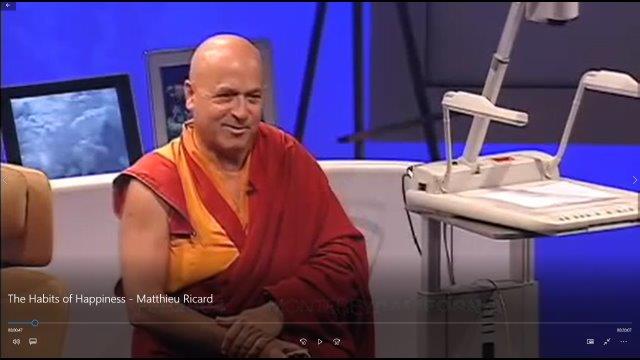
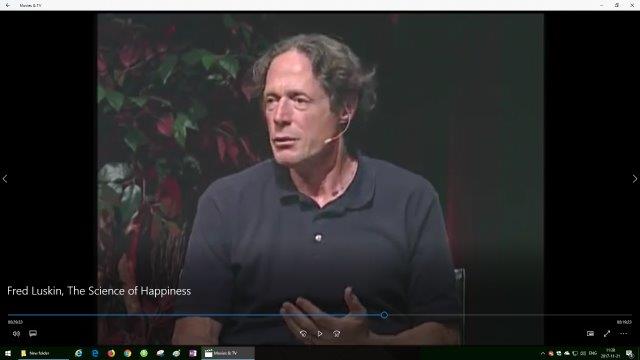
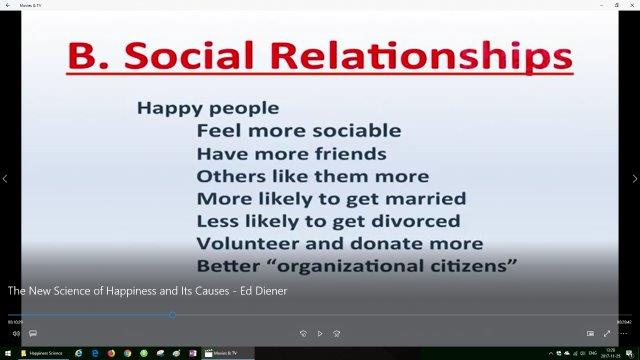
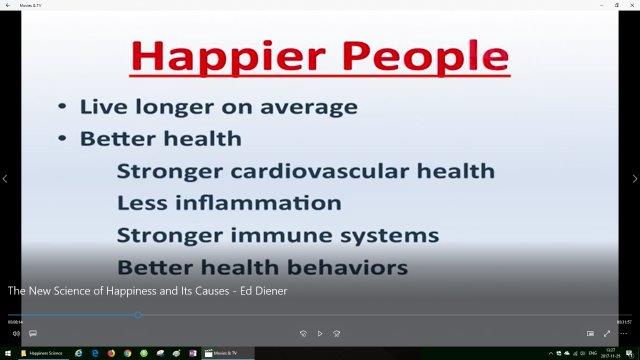
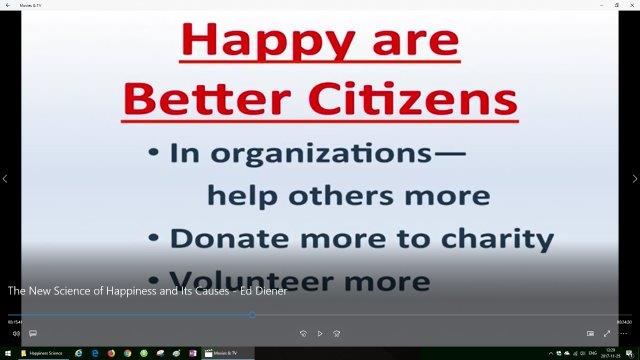
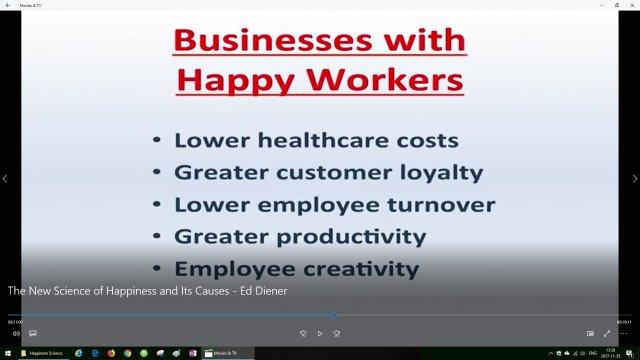
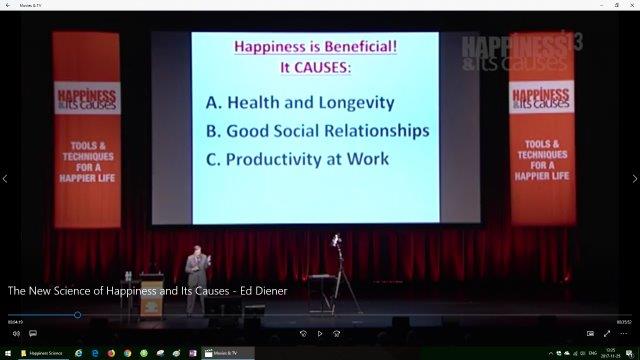
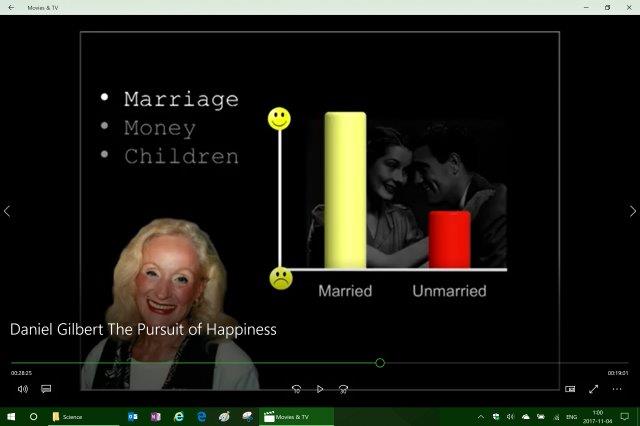
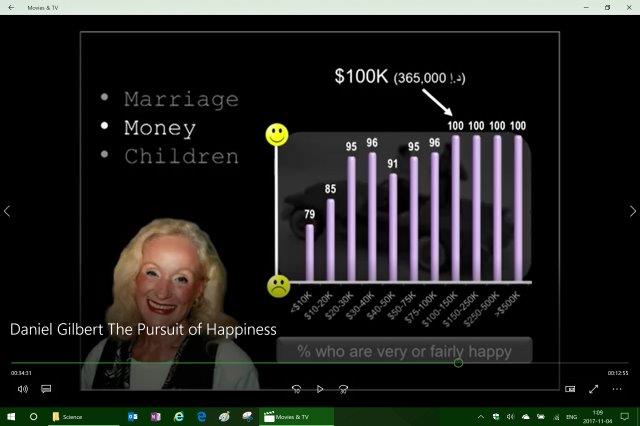
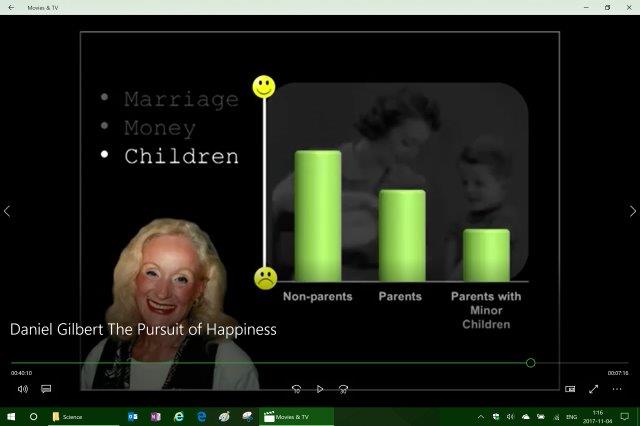
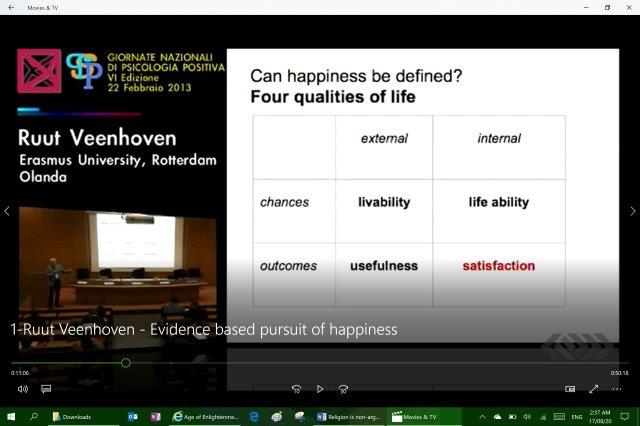
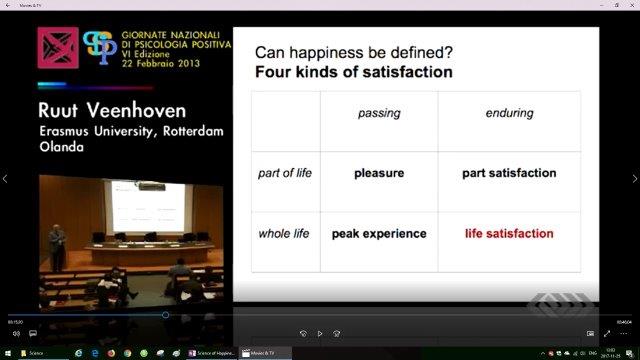
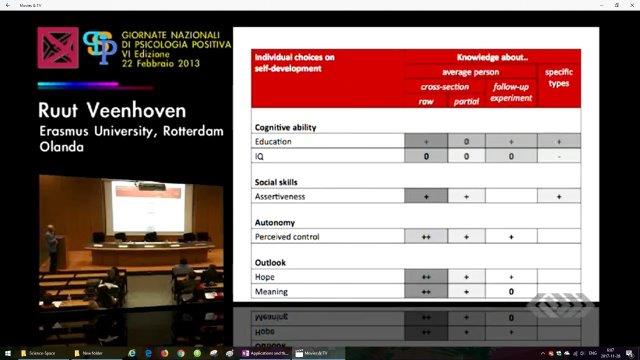
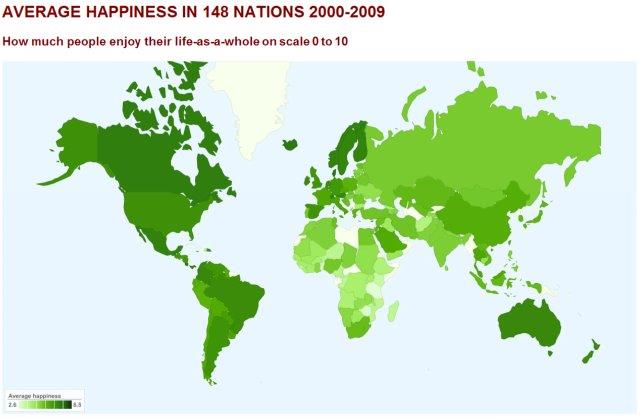
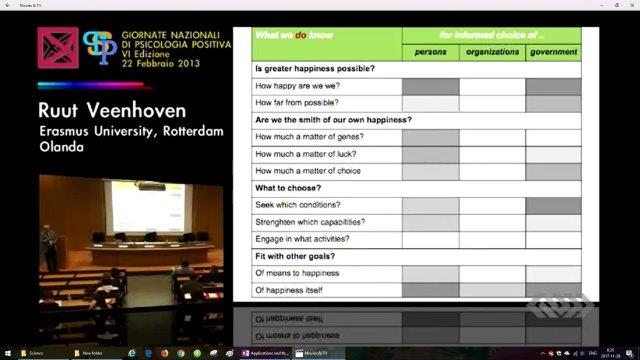
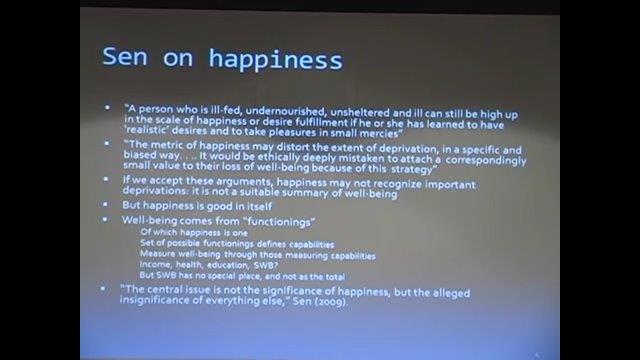
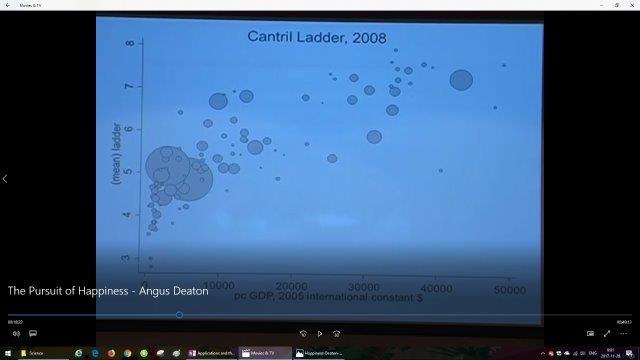
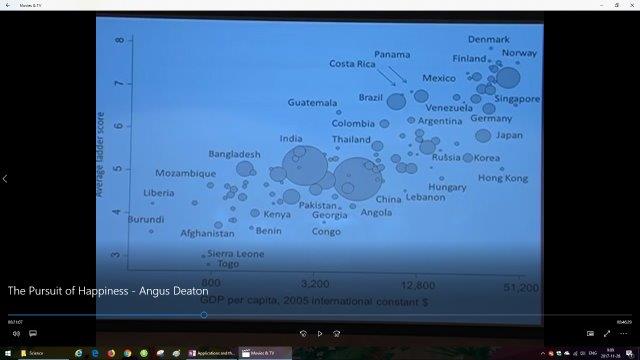
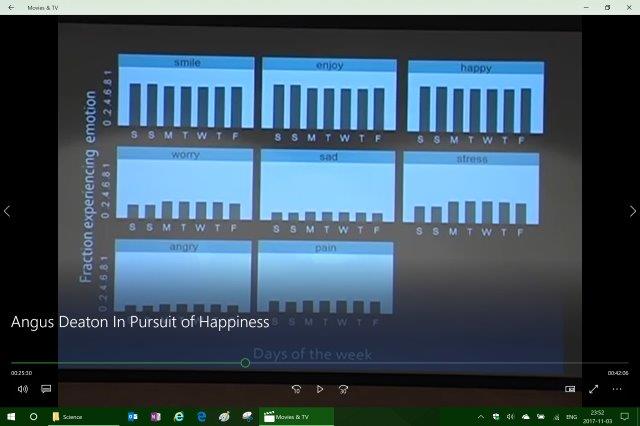
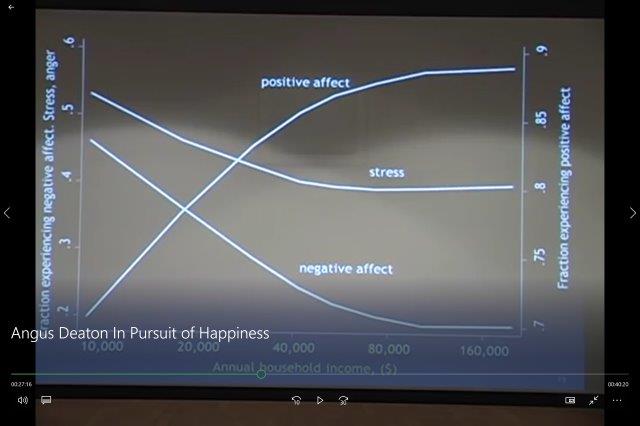
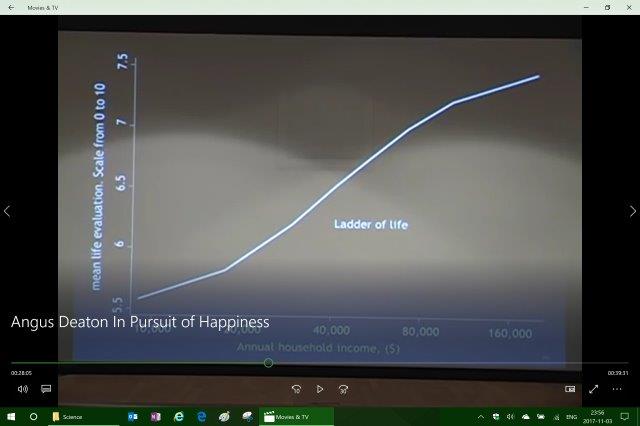
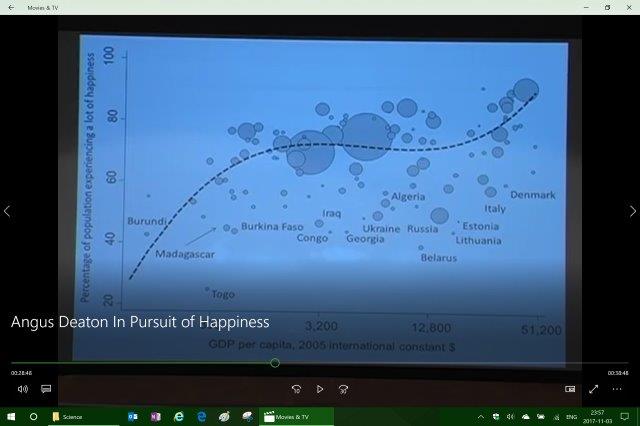
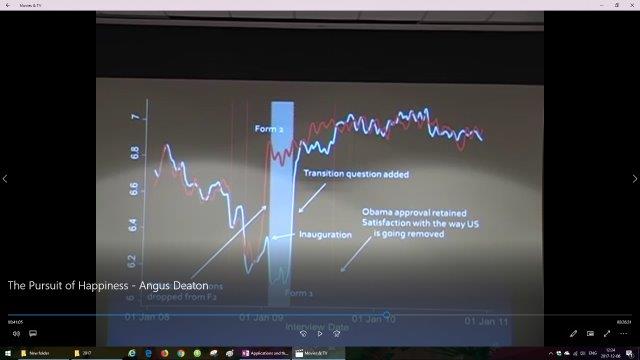
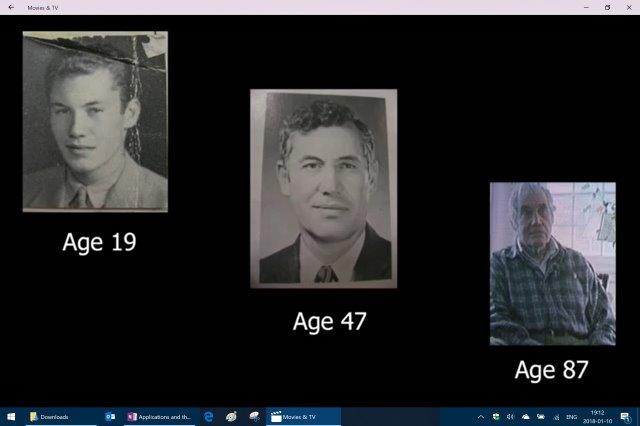
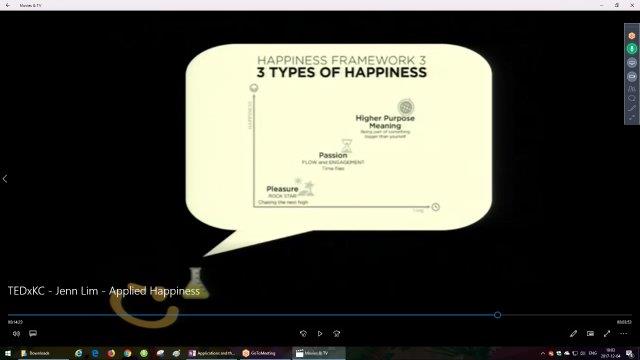
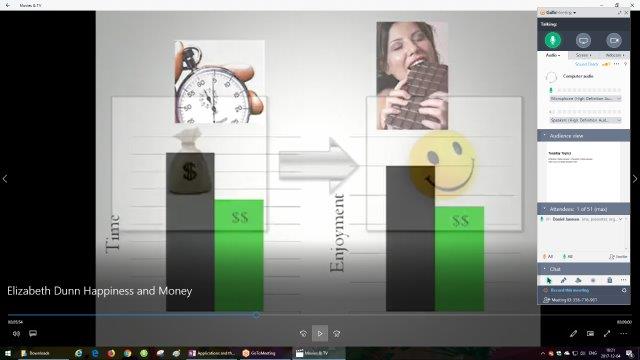
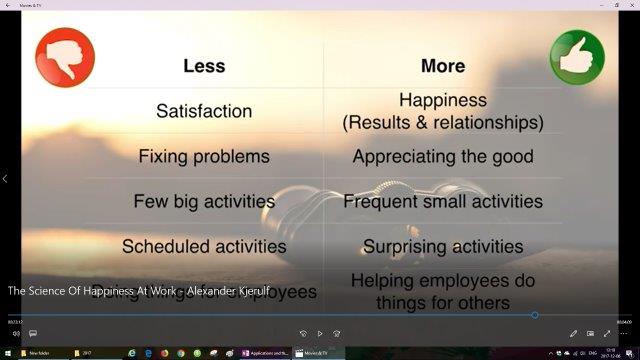
Definitions key to discussions: